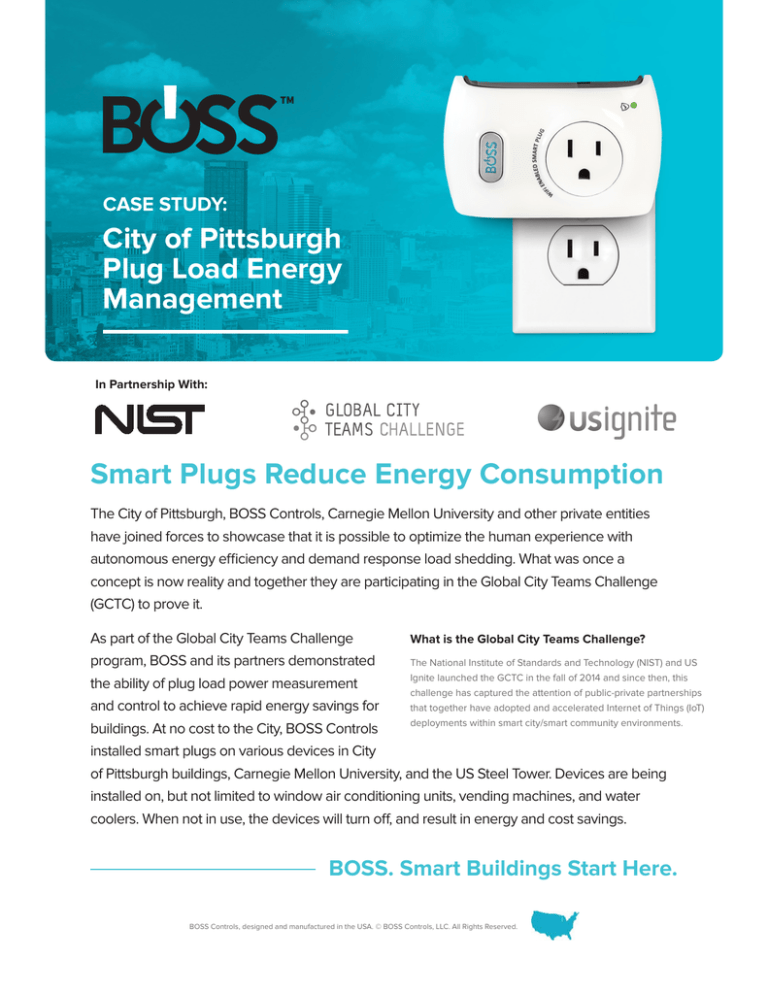
CASE STUDY:
City of Pittsburgh
Plug Load Energy
Management
In Partnership With:
Smart Plugs Reduce Energy Consumption
The City of Pittsburgh, BOSS Controls, Carnegie Mellon University and other private entities
have joined forces to showcase that it is possible to optimize the human experience with
autonomous energy efficiency and demand response load shedding. What was once a
concept is now reality and together they are participating in the Global City Teams Challenge
(GCTC) to prove it.
As part of the Global City Teams Challenge
What is the Global City Teams Challenge?
program, BOSS and its partners demonstrated
The National Institute of Standards and Technology (NIST) and US
Ignite launched the GCTC in the fall of 2014 and since then, this
the ability of plug load power measurement
challenge has captured the attention of public-private partnerships
and control to achieve rapid energy savings for
that together have adopted and accelerated Internet of Things (IoT)
deployments within smart city/smart community environments.
buildings. At no cost to the City, BOSS Controls
installed smart plugs on various devices in City
of Pittsburgh buildings, Carnegie Mellon University, and the US Steel Tower. Devices are being
installed on, but not limited to window air conditioning units, vending machines, and water
coolers. When not in use, the devices will turn off, and result in energy and cost savings.
BOSS. Smart Buildings Start Here.
BOSS Controls, designed and manufactured in the USA. © BOSS Controls, LLC. All Rights Reserved.
Case Study
Equipment connected to building
BOSS and the GCTC Project Summary
receptacles draw a considerable
,,
The project goal was to demonstrate plug load power
measurement & control and achieve rapid energy savings to
amount of power, often on a 24/7 basis.
buildings
Based on US Department of Energy
,,
Prove ability to aggregate plug loads across multiple buildings
estimates, this “plug load” accounts for
for demand response events
approximately 25% of the electricity
,,
Provide utilities a virtual power plant and reduce peak demand
costs and emissions
used within commercial buildings. The
,,
Prove ability to provide autonomous energy efficiency
BOSS Smart Plug family of products is
capability, while adjusting to multiple inputs such as real time
designed to address this opportunity to
energy costs to enable additional savings
enable energy and operational savings.
,,
Optimize end user experience
Through intelligent scheduling of device
off times to match periods when the equipment is not utilized or when the building is
unoccupied, facilities are able to achieve significant energy savings with simple paybacks
of under one year for deployment of Smart Plugs. By leveraging existing network
infrastructure, the BOSS Smart Plugs family enables centralized monitoring and control of
the connected devices via standard web browsers and mobile applications. Furthermore,
the connected Smart Plugs provide a means to support advanced applications including
demand response and peak load management.
This case study provides comprehensive information on achieving over 53% energy and
electricity expenditure reduction by utilizing the BOSS Smart Plugs.
What We Did
BOSS Controls installed Smart Plugs on various devices in City of Pittsburgh buildings,
Carnegie Mellon University, the US Steel Tower. The selected facilities are dispersed
over the Pittsburgh, Pennsylvania region and with a variety of building types including
commercial office high rise, university, and municipal facilities. Within those facilities
the BOSS team selected a variety of plug loads including: water coolers and water
fountains, coffee pots, and vending machines. The BOSS Smart Plugs have integrated
power measurement and reporting capabilities which simplified the data collection and
reporting.
The Smart Plugs were installed and connected to those devices to collect baseline data
for a minimum period of 14 days.
BOSS Controls, designed and manufactured in the USA. © BOSS Controls, LLC. All Rights Reserved.
Case Study
Commercial Building Plug Load Control: Operation with
Shutdown During Unoccupied Periods
3,000.00
70.0%
60.1%
2,500.00
59.3%
60.0%
55.9%
52.5%
2,000.00
50.0%
48.2%
40.0%
39.0%
1,500.00
30.0%
1,000.00
20.0%
500.00
10.0%
0.0%
Coffee Pots
Copiers and
Printers
Snack Machines Soda Machines
Water Coolers
and Water
Fountains
Average
Baseline Annual Consumption (kWh)
Post Installation Average Annual Consumption (kWh)
Annual Energy Savings (kWh)
% Savings
After the baseline data collection period, schedules were implemented to turn the
devices off during unoccupied periods. These unoccupied periods were typically
weekdays before 6:00 AM, weekdays after 6:00 PM, and during weekends. The Smart
Plugs were run with the implemented schedule for a minimum of 14 days to measure and
validate the energy savings.
Commercial Building Plug Load Control: Percentage Savings with
Operation with Shutdown During Unoccupied Periods
70.0%
60.0%
50.0%
40.0%
30.0%
20.0%
10.0%
0.0%
City of Pittsburgh
CMU
Other Commercial
Building
US Steel Tower
BOSS Controls, designed and manufactured in the USA. © BOSS Controls, LLC. All Rights Reserved.
Total
Case Study
Demonstrated Results
The program demonstrated the following key results:
Schedule-based control has substantial energy savings. Use of schedule-based shutdown
during unoccupied periods results in substantial energy savings in excess of 50%.
Equipment with the Highest Energy Consumption has the greatest benefit. On a total
energy savings basis, the benefit is the largest for the equipment with the highest energy
consumption (e.g., soda vending machines) with a lower benefit for equipment that has
low consumption or low unoccupied consumption (e.g., water fountains, copiers)
Short Payback Period. For the Smart Plugs installed in this study, the simple payback
for all areas is less than 1 year with simple payback as short as 4 months for high energy
consuming equipment.
Justification for Wide Deployment. The energy savings, short simple payback, and
verifiable results substantiate wider deployments throughout the selected facilities.
Additional Findings and Benefits
The program demonstrated the following key results:
,,
Integrated measurement and real time reporting capabilities that enabled rapid
feedback on energy savings
,,
Provided end user feedback with automated controls, optimizing energy savings and
end user experience
,,
Cloud-based control provided a mechanism to support Automated Demand Response
Events down to the plug load with measurement verification
,,
Based on 2015/16 PJM Annual DR Program values, the contribution of each Smart
Plug is another $9.10 of average value to the facility
,,
Operational Savings through:
,,
Schedule-based controls continue to reduce operating hours and extends
equipment operating life
,,
Automated alerts for unscheduled on/off, power levels exceeding thresholds,
enable peak equipment operating performance
BOSS Controls, designed and manufactured in the USA. © BOSS Controls, LLC. All Rights Reserved.
Case Study
BOSS Smart Plug Product Features
,,
Single 120V (15 Amp) or 220V (20 Amp) grounded plug-in controller
,,
Use your existing WiFi network with no additional networking infrastructure required
,,
Controlled via mobile device or computer with internet connection
,,
Program with 7-day schedules and easily upload saved schedules to large groups of
devices simultaneously
,,
Monitor real-time and peak power usage (watts)
,,
Monitor and graph energy consumption (kilowatt hours)
,,
Group and simultaneously control multiple devices by location, device type or any
user defined category
Don’t just manage, BOSS.
Contact our sales team today by calling 1-855-708-4990
or Email us at info@bosscontrols.com
BOSS Controls, designed and manufactured in the USA. © BOSS Controls, LLC. All Rights Reserved.



